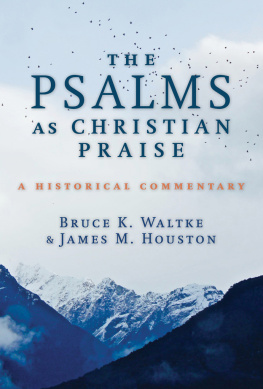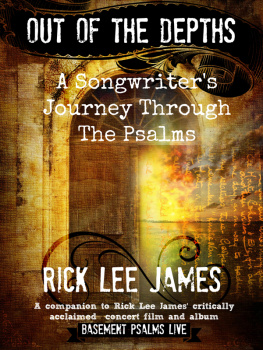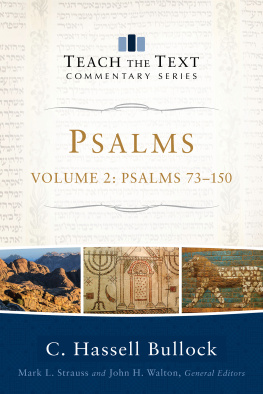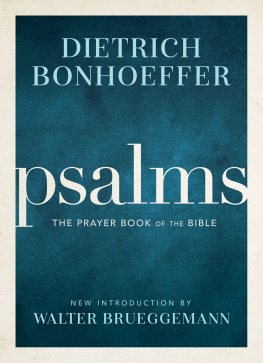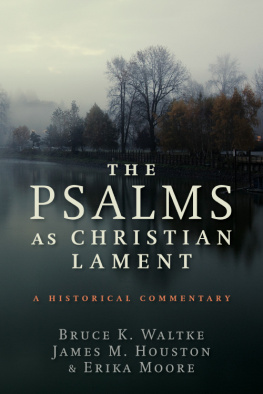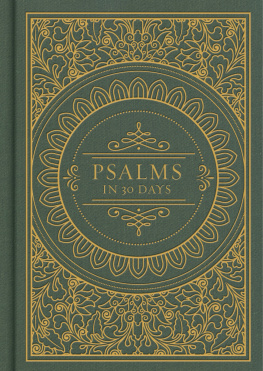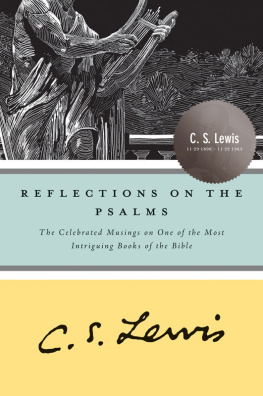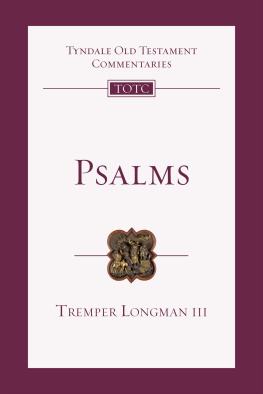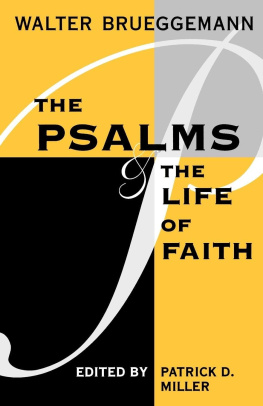THE BIBLE SPEAKS TODAY
The Message of
Psalms 73150
Songs for the People of God
MICHAEL WILCOCK
InterVarsity Press
P.O. Box 1400, Downers Grove, IL 60515-1426
World Wide Web: www.ivpress.com
E-mail:
Michael Wilcock 2001
All rights reserved. No part of this book may be reproduced, stored in a retrieval system or transmitted in any form or by any means, electronic, mechanical, photocopying, recording or otherwise, without the prior permission of InterVarsity Press.
InterVarsity Press is the book-publishing division of InterVarsity Christian Fellowship/USA, a movement of students and faculty active on campus at hundreds of universities, colleges and schools of nursing in the United States of America, and a member movement of the International Fellowship of Evangelical Students. For information about local and regional activities, write Public Relations Dept., InterVarsity Christian Fellowship/USA, 6400 Schroeder Rd., P.O. Box 7895, Madison, WI 53707-7895, or visit the IVCF website at .
All Scripture quotations, unless otherwise indicated, are taken from the Holy Bible, New International Version. NIV. Copyright 1973, 1978, 1984 by International Bible Society. Used by permission of Hodder and Stoughton Ltd. All rights reserved. NIV is a registered trademark of International Bible Society. UK trademark number 1448790. Distributed in North America by permission of Zondervan Publishing House.
Cover design: Cindy Kiple
Image: Marilee Whitehouse-Holm/Getty Images
ISBN 978-0-8308-8318-9 (digital)
ISBN 978-0-8308-1245-5 (print)
This digital document has been produced by Nord Compo.
In affectionate memory of
Joseph Cort McPhail
who loved words
and
Frederick Henry Pickering
who loved the Word
BOOK III
(Psalms 73 89)
The Asaph Collection: Psalms 73 83
Three famous David psalms (15, 24, and 68) have already drawn our attention to the great day when Gods ark was brought to its final home in Gods city. Together with an account of the event, 1 Chronicles 15 and 16 give details of how David planned the worship of the sanctuary for that day and for later times. He appointed three men, one from each of the three clans of the tribe of Levi, to supervise its music: Heman and Ethan at Gibeon, where the altar of sacrifice was, and Asaph at Jerusalem.
Of these three men, Asaph is the one of chief interest in Book III of the Psalter. While each of the others is connected with one psalm at the end of the book (88 is of Heman, 89 of Ethan), no fewer than eleven are psalms of Asaph. Another that we have considered already (50) is placed between the first Korah Collection and the second David Collection, in the middle of Book II. They are a magnificent group, covering a wide range of themes.
We cannot help noticing that at least two relate to the destruction of Jerusalem in 587 BC. How is it that we find psalms of Asaph, who lived in the time of David at the beginning of the monarchy, lamenting something that took place 400 years later, at the end of it?
It so happened that on the day I was writing this the oratorio Belshazzars Feast, by William Walton, was broadcast from Leeds Town Hall, one of the great centres of the musical life of the north of England; and the performers included the Leeds Festival Chorus. The work, which incidentally quotes an Asaph psalm (81), had been premiered nearly seventy years earlier, from the same concert hall, by the same choir. What unbelievably long-lived singers, you say!
There are even more frequent mentions of Asaph alone, stretching over an even longer period.
It is not surprising then to find in the psalms that bear his name a broad overview spanning the whole period of the monarchy. Indeed it ranges not only further on, beyond the exile to the restoration, but further back, beyond the judges to the exodus, and sees the Lords activity throughout. Like the Korah and David Collections of Book II, these psalms use the word God far more often than the word LORD. But the God of the Asaph Collection is repeatedly a God who judges, as he did in Egypt; who speaks, as he did at Sinai; and who over the years constantly shepherds his people. In other words, he is the Elohim who by his acts shows himself very clearly to be Yahweh the Lord, the God of Israel.
As to why these psalms should have been placed where they are in the Psalter, the remarkable Psalm 73, standing at the head of the main collection, may at once begin to yield clues.
Psalm 73
Apart from the isolated example in the middle of Book II, this is the first of the Asaph psalms, and one of great importance.
What will lead us through it step by step is the psalmists train of thought, rather than a division into stanzas or some other poetic device. Even so, a significant word we have noticed elsewhere reappears here, and acts as a marker, whether intentionally or not, at the beginning of each of three logical sections. It is the Hebrew word a, meaning (as we saw in Ps. 62) truly or only, surely or really, and having an effect not unlike that of italics in English. The opening line of Psalm 73 demonstrates this.
1. The psalmists problem (vv. 112)
Surely God is good to Israel. He really is. The word is not here a meaningless filler, as it sometimes can be (We really want to thank you, Lord: why, who needs convincing? If we want to, lets get on and do it, without the aid of windy adverbs). No; verse 1 is a creed. Like the negatives of the first psalm, it defines what Israel believes: not this, but that. Over against the other faiths and the other gods of Bible times, she believes that her God really is what he claims to be.
But is he? What we see in the world seems to contradict what we say in church. According to our creed, it is to those who are right with him that God is good, whereas the wicked are like chaff that the wind blows away (Ps. 1 again). But the evidence of our eyes tells us otherwise. The word surely takes on a very different tone Oh, surely you remembered!, meaning you almost certainly didnt and the psalmist cries out in distress, Surely, Lord, you are supposed to be good to Israel, arent you? Because it doesnt look much like it to me.
He sees the prosperity of the wicked (v. 3), the very shalom that Psalm 72 promised not to them but to Gods own people. How can those who have no interest in God be so healthy, strong, and carefree (vv. 45)? How can they be so arrogant and malicious (vv. 69), and get away with it? And why are they allowed to lead so many others astray (vv, 1011)? My people turn to them and lap up all they say, asking, How will God find out?
Hence the psalmists doubts and questions. It is not that his faith is slipping into unbelief; doubt is something only a believer can experience, for you can only doubt what you believe. Doubt is to unbelief what temptation is to sin. A test, but not yet a surrender. But something is slipping: his confidence, his assurance, his peace of mind (vv. 23).
2. The psalmists crisis (vv. 1317)
Surely in vain have I kept my heart pure. What is the point of trying to do right when it is those who do wrong who thrive? The point is sharpened for the psalmist when he himself begins to be plagued and punished when the righteous receives what the wicked deserves. If we are honest we have to admit that for most of us innocent suffering remains a purely academic problem, until we become the suffering innocent in question.


